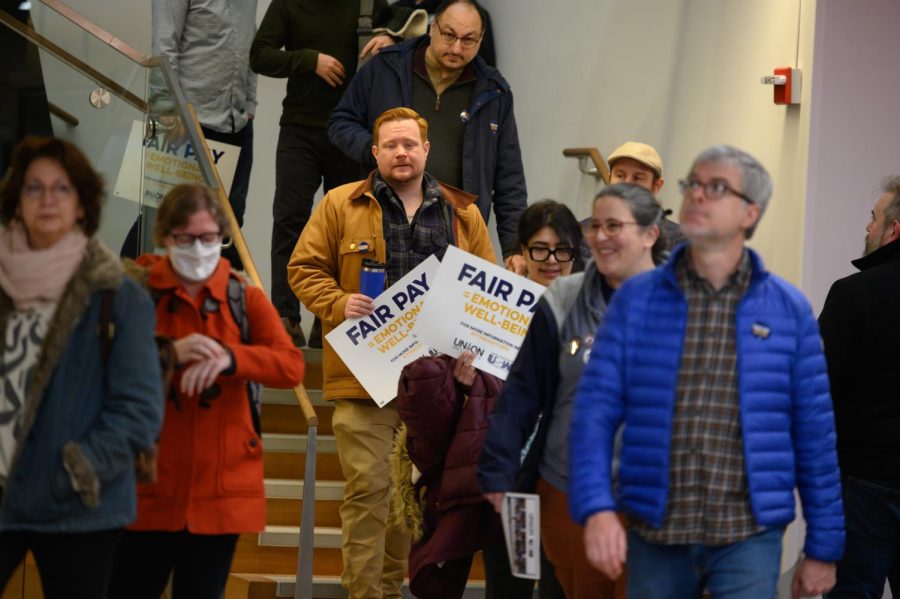Faculty union rallies as compensation negotiations remain stalled
Nate Yonamine | Senior Staff Photographer
Protestors leave a faculty union protest at Posvar Hall Tuesday morning.
April 19, 2023
Pitt’s faculty union held their fourth and likely final demonstration of the academic year on Tuesday morning, gathering at Posvar Hall to push the pace of compensation negotiations for the union’s first contract.
Around 100 faculty members, alongside a handful of graduate student union organizers and undergraduates, congregated outside of the building before heading inside to occupy the room adjacent to where a bargaining session was set to begin.
Pitt police locked the doors to the building moments after union supporters filed inside. Around half a dozen police officers were stationed on the first and second floors of Posvar Hall during this time.
After about 15 minutes, faculty members who aren’t part of the bargaining team exited the room while singing “Solidarity Forever,” a frequently used labor anthem at these demonstrations.
Once back outside, Lech Harris, an adjunct English professor and bargaining committee member, spoke to the crowd about his experience coming to Pitt from Rutgers, which has one of the nation’s oldest higher education unions, and his shock at the low pay rate for part-timers.
“I literally emailed the curriculum coordinator right back and said ‘I’m so sorry, I think there might have been a mistake,’” Harris said.
Pitt offers adjunct professors with doctoral degrees, such as Harris, roughly $3,000 per course, while those without doctoral degrees receive a lower rate.
Harris added that lackluster compensation has forced many of his colleagues to leave the University and take jobs outside of higher education
“One thing you find when you talk to a lot of Pitt adjuncts, is that many of them are not Pitt adjuncts anymore,” Harris said. “They have left.”
The union first proposed a compensation structure in November with a $60,000 salary floor and yearly “experience increases” of $5,000 for full-time faculty. Part-timers would benefit from these changes proportional to their workload, and all faculty members would see annual cost-of-living adjustments.
Pitt has yet to offer a counterproposal on compensation, but has posted their other proposals online on contract renewals, faculty evaluations and academic freedom. University spokesperson Jared Stonesifer declined to say when administration plans to offer their counterproposal for pay.
“There are some proposals that have been submitted by the union that the University has not immediately responded to due to the need to gather additional information and present the union an informed response,” Stonesifer said. “Collective bargaining is a back-and-forth process and that requires give and take on both sides.”
According to a Bloomberg Law analysis, it takes an average of 466 days for a newly formed education union to reach a collective bargaining agreement with their employer.
As of Tuesday, it’s been 537 days since the Pennsylvania Labor Relations Board certified the union, with no clear end to negotiations in sight.
According to Harris, Pitt’s bargaining team is composed of internal and external lawyers as well as representatives from the Office of the Provost. Law firm Ogletree, Deakins, Nash, Smoak & Stewart serves as the University’s legal counsel for contract negotiations.
The union and administration met on April 4 and Monday in addition to Tuesday. Two to three bargaining sessions per month has been typical for the spring semester.
Pete Bell, a member of the union’s communications and action team, said demonstrations appear to have an impact on the productivity of these sessions.
“Everytime we do one of these, there is progress,” Bell said. “It seems like the administration needs more reminders that this is something that’s very important to a lot of faculty.”
Emma Gray, a senior environmental science major, joined in solidarity with the faculty union. The United Steelworkers invited student supporters to the protest, and has circulated an online form for students who wish to receive updates on bargaining and upcoming actions.
“[My professors] don’t have any childcare, they get underpaid, overworked and it affects our learning conditions,” Gray said. “I think Pitt is failing and they deserve better.”
Several graduate student union organizers attended as well, including Elliot Davis, who said the struggles of faculty and graduate workers are one in the same.
The graduate student union drive has gained momentum amid a recent flurry of landslide union wins at other universities, and Davis said organizers hope to initiate a card campaign sometime this year. Davis added that he senses the University is sending a message to graduate student and staff union organizers by prolonging negotiations with the faculty union.
“I feel like Pitt is doing everything they can to slow the brakes on this so that they don’t have to deal with the staff union and the grad union and so that they can send the message that they still have the power,” Davis said.



